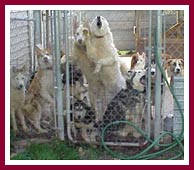This was home...
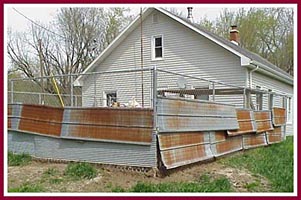 "[The
Adamses] had good intentions...but the road to hell is paved with good
intentions, and this situation was definitely a considerable distance down that
road for the animals involved. On top of that, in their untrained, unprepared
and unfinanced 'rescue' efforts, these people SIGNIFICANTLY contributed to MORE
homeless pets!" "[The
Adamses] had good intentions...but the road to hell is paved with good
intentions, and this situation was definitely a considerable distance down that
road for the animals involved. On top of that, in their untrained, unprepared
and unfinanced 'rescue' efforts, these people SIGNIFICANTLY contributed to MORE
homeless pets!"
John
and Martha Adams love dogs. They love all types of dogs, large and small, but
mostly the big ones -- huskies, rotties, and the like. In fact, they love them
too much for their knowledge or means, and, in April 2006, found themselves in
a "situation." They had over 70 dogs, limited space, limited money
for dog food, and nothing left over to pay even the most rudimentary vet bills.
How
did the Adamses (not their real names) acquire so many dogs? Well, John
obtained sixteen from the local "no-kill" shelter, where he
volunteered -- officially and unofficially -- several in June 2005 alone, and
the last, in April 2006, when he already had over 70 dogs at his home. Even
though the shelter had a spay/neuter policy, for some reason, seven of sixteen
John brought home, including two that he had signed adoption papers for,
"slipped through the cracks" and were unaltered.
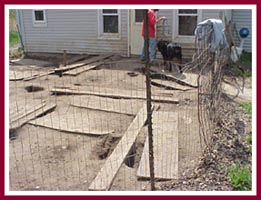 Two of the dogs that came home with
John, one just a puppy, were obtained in the shelter parking lot from their
owners. They had been turned away by the shelter because of lack of shelter
space. Only one of these had been altered.
Two of the dogs that came home with
John, one just a puppy, were obtained in the shelter parking lot from their
owners. They had been turned away by the shelter because of lack of shelter
space. Only one of these had been altered.
Three
were strays found by the Adamses; two were unaltered. One dog came from a
shelter in a neighboring county that did, thankfully, enforce its spay/neuter
policy.
Fifteen
were "unsold stock" from John's former employer, commercial breeder
Yvonne Skinner (whose kennel, "Woodland Pets," coincidentally,
produced Mr. Peabody, guiding spirit
of the Wisconsin Puppy Mill Project). According to John, they weren't worth
their keep to her; if John hadn't taken them off her hands, they would have
been "disposed of." To John's credit, he says he detested working for
these people, and quit. However, eleven of the dogs he acquired from Ms.
Skinner were also unaltered.
It
isn't difficult to see where this is going: even as the Adamses brought home
more and more dogs from the local shelter, the unaltered "rescued"
mill and shelter dogs which they already had were doing what unaltered dogs
will do when left alone together: they reproduced. Then, some of their (also
unaltered) offspring reproduced.
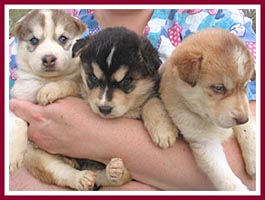 As of 24 April 2006,
39 of the dogs present on the Adams property had been BORN there,
some of parents who had also been born there. One such pup born to a former
puppy mill mother had THREE known litters; pups from her latest two were still
onsite. Two siblings from a litter born onsite a year and a half ago became
parents to another litter before they were a year old. Because the Adamses
routinely "rehomed" some of these pups and sold others, nobody knows
for certain just how many unwanted litters have been produced. As of 24 April 2006,
39 of the dogs present on the Adams property had been BORN there,
some of parents who had also been born there. One such pup born to a former
puppy mill mother had THREE known litters; pups from her latest two were still
onsite. Two siblings from a litter born onsite a year and a half ago became
parents to another litter before they were a year old. Because the Adamses
routinely "rehomed" some of these pups and sold others, nobody knows
for certain just how many unwanted litters have been produced.
What
an ironic twist of fate for the ones "saved" from a known
puppymiller, to have litter after litter born -- and sold -- while in the
Adamses' custody!
The
latest puppies came along in March. As they had done in the past when new
puppies swelled the ranks of their huge canine "family," the Adamses
put an ad in the classified sections of local newspapers to sell some of the
animals.
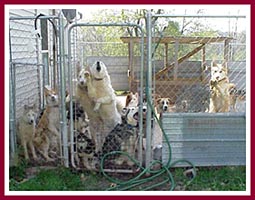 Annie Jones also
loves dogs. Annie, who also asked us not to use her real name, just happened to
be looking for a husky pup, saw one of the Adamses' ads, and decided to pay
their rural Wisconsin home a visit. Once there, she was shocked to find dozens
of dogs and puppies packed together in the outside pen, with no room to run and
play, and only a small lean-to shelter and a few plastic dog houses available
to them to escape from the sun and rain. Though the concrete floor looked to be
hosed down regularly, Annie's nose twitched at the smell of so many long-haired
dogs in such a confined space (along with the inevitable doggy waste products
between hosings). She couldn't believe it when the Adamses assured her that
they let ALL the dogs into their small ranch-type home at night. Annie Jones also
loves dogs. Annie, who also asked us not to use her real name, just happened to
be looking for a husky pup, saw one of the Adamses' ads, and decided to pay
their rural Wisconsin home a visit. Once there, she was shocked to find dozens
of dogs and puppies packed together in the outside pen, with no room to run and
play, and only a small lean-to shelter and a few plastic dog houses available
to them to escape from the sun and rain. Though the concrete floor looked to be
hosed down regularly, Annie's nose twitched at the smell of so many long-haired
dogs in such a confined space (along with the inevitable doggy waste products
between hosings). She couldn't believe it when the Adamses assured her that
they let ALL the dogs into their small ranch-type home at night.
Annie
could have simply bought her puppy and driven away, rationalized that the
situation wasn't really that bad. At least, none of the dogs looked dangerously
skinny or sick. She could have tried to put all of those furry faces and
wistful eyes out of her mind -- but she didn't.
Instead,
Annie called the local authorities to express her concerns.
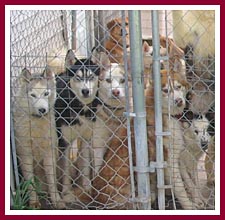 Animal Control and a
federal inspector visited the Adamses, and discovered a real
"situation." Because of the vast number of unaltered dogs, the
unchecked breeding, and the attempt to sell through the classifieds, John Adams
definitely fell into the category of "large-scale backyard breeder,"
intentional or not. Conditions were beginning to resemble the very puppy mills
the Adamses professed to hate, but inspectors could not find any violations of
the state's inadequate anti-cruelty
laws. Other than citing the Adamses for lack of county dog licenses and
state-mandated rabies vaccinations, there wasn't much they could do. Animal Control and a
federal inspector visited the Adamses, and discovered a real
"situation." Because of the vast number of unaltered dogs, the
unchecked breeding, and the attempt to sell through the classifieds, John Adams
definitely fell into the category of "large-scale backyard breeder,"
intentional or not. Conditions were beginning to resemble the very puppy mills
the Adamses professed to hate, but inspectors could not find any violations of
the state's inadequate anti-cruelty
laws. Other than citing the Adamses for lack of county dog licenses and
state-mandated rabies vaccinations, there wasn't much they could do.
Simply
fining the Adamses would not get the dogs the help they needed, nor keep
conditions at the Adams property from deteriorating further. After considerable
head-scratching, the authorities contacted the Wisconsin Puppy Mill Project
(WPMP). They explained the convoluted situation to Wisconsin Puppy Mill
Project's Executive Director, who is also a certified WI Humane Officer, asking
if she could figure out a way to intervene -- even though the Adamses lived in
another county and more than 100 miles away.
Her
reply: "Of course!"
Next Page: The
Intervention
|

